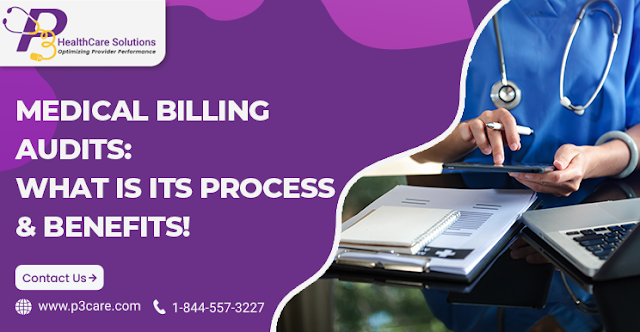Medical Billing Audits: What Is Its Process and Benefits!
A medical billing audit is a structured process in which the reliability and effectiveness of clinical documentation get assessed. In simple words, it is the monitoring and inspection of medical billing services.
It checks all the health records that have been kept and maintained by medical practices and reviews the medical billing data submitted to insurance payers. Further stated, it also helps medical practices fix inappropriate billing practices and keep an eye out for them in the future.
Requirements of a Billing and Audit
Doing a full-fletched billing audit requires a lot of sources. So, when auditing, a practice needs to provide different types of clinical records, such as:
- Medical records
- X-rays and lab reports
- Financial records (charge sheets, remittance advice, etc.)
- Accounts Receivable (AR) ledger
- Other documents that are related to their policy
Prospective & Retrospective
Audits are conducted either before insurance claims or after the claims get fulfilled. There are no specific conditions regarding this.
The audits sent before the claims come under the prospective category, while those sent after come under the retrospective category. It usually depends on what the practice prefers or what the medical billing auditors work with.
Medical Billing Audit Process
The auditing process goes through the following steps.
Determination of Resources
Firstly, the audit and the resources needed for it get assessed. It can include things like:
- Involvement of clinical staff in the process
- The payer mixes
- Workings of the billing and coding staff
Assessment of the Situation
Next up, the situation or scene of the audit gets evaluated by the auditing medical billing services. Are there any increased risks that need prior notice? Any trends that require investigation? These are usually taken care of during this step.
Other things like checking proper CPT codes usage by the medical billing staff, the frequency of healthcare delivery services, etc., are also looked into here.
Taking The Required Actions
After the previous step, actions get taken towards improving patient outcomes and the revenue management cycle.
It consists of slight changes such as:
- Setting targets for improvements
- Devising solutions for internal problems
- Pushing payers to improve areas in which they are lacking
Keeping It In Mind
After these things are taken care of, it is best to remember the process so that auditing in the future can be easier to carry out.
Benefits of Medical Billing Audits
No matter how busy medical practices are, they know that billing audits are hugely beneficial. They can take care of many things regarding medical coding, administration, and even the clinic itself.
Coding Benefits
Coding staff can benefit from the auditing process in the following ways:
- It helps them identify and correct coding issues before they get challenged by anyone from insurance companies or the government.
- It lets them have someone to rely on, who can find the inaccuracies in their work and give suggestions for corrections.
- It helps them with their abilities while also ensuring they use the updated procedural codes.
Plus, it lets the auditors know where the coding staff lacks knowledge and what they need to learn or where training is still required. Moreover, it ensures the implementation of proper coding protocols so that no visits from high-profile government-level professionals like RACs or ZPICs are warranted.
Administrative Benefits
The administrative staff benefits from medical billing audits in the following ways:
- There is assurance regarding accurate claim submission. In addition, it is also easy to confirm which of the claims are true.
- There is no frustration among the staff when carrying out a task, as the standard they need to meet is predetermined. Moreover, it leads to a stable working environment that attracts new and talented people.
- Things like under, over, or improper use of coding and billing occur less, as the billing for regular procedures is performed by following the right policies. It also minimizes the chance of a visit from an external auditor.
- Because of medical billing audits, the chances of fake billing activities, claims, and incorrect payments are very slim.
- Verifying ICD-10-CM and HIPAA compliance and EHR Meaningful Use is much easier with an internal check and balance system.
- Identifying things like reimbursement deficiencies due to inappropriate coding becomes easy and can be worked on quickly to boost revenue.
- Lastly, the practice benefits from all this as claiming payments is optimized by efficiently processing files.
It all leads to an improved relationship with the insurance or paying company, as they appreciate accurate claims sent by the medical billing companies.
Clinical Benefits
The clinical benefits of medical billing auditing mostly deal with patient care and its improvement.
If services get an upgrade for patients, then it helps give the clinic a positive reputation. That, in turn, leads to more revenue generation as more numerous people want to come here to fulfill their healthcare needs.
Conclusion
Medical billing audits reveal any problems that medical practices may be undergoing. Such a practice helps fix issues before they get noticed by a higher power or a large payer. It saves them from having to give out an external audit and keeps the practice fully functional. Moreover, the medical billing services go seamlessly.
Read more: How Outsourcing Medical Billing Services Is Beneficial for Your Practice?




What is the process of conducting medical billing audits, and what are the benefits associated with them?
ReplyDelete